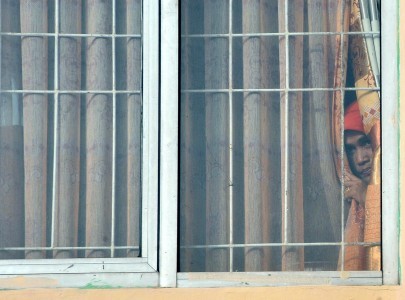Popular Reads
Top Results
Can't find what you're looking for?
View all search resultsPopular Reads
Top Results
Can't find what you're looking for?
View all search resultsIS supporters may return to their homes scot free
Change text size
Gift Premium Articles
to Anyone
 A woman peeks through a window at Bambu Apus social shelter in East Jakarta on Monday, Feb. 6. The shelter currently housed 75 Indonesians deported from Turkey for allegedly attempting to enter Syria and join Islamic State group. The government put them in custody in the shelter for deradicalization program before returning them to their hometowns. (Antara/Yulius Staria Wijaya)
A woman peeks through a window at Bambu Apus social shelter in East Jakarta on Monday, Feb. 6. The shelter currently housed 75 Indonesians deported from Turkey for allegedly attempting to enter Syria and join Islamic State group. The government put them in custody in the shelter for deradicalization program before returning them to their hometowns. (Antara/Yulius Staria Wijaya)
T
he Bambu Apus shelter in East Jakarta looks like any regular rehabilitation center where children can be seen playing without a particularly heavy security presence.
But that does not mean visitors can simply drop into the shelter, which currently houses 75 people deported from Turkey, Singapore and Japan for allegedly trying to join the Islamic State (IS) terrorist group in Syria.
“I’m sorry, entry to this place must be approved by the National Police’s counterterrorism squad Densus 88,” a man holding a walkie-talkie told The Jakarta Post at the shelter’s gate.
Of the 75 people housed in the shelter, which has a total capacity of 130 people, 17 are men, 24 are women and 34 children.
Many of them are related to each other. The last batch of alleged IS supporters sent to the shelter includes former Finance Ministry official Triyono Utomo, 40, his wife Nur Khofifah, 55, and three children aged 12, 7 and 3.
Unlike neighboring Malaysia, which has charged a number of people with trying to join IS in Syria under its penal code, Indonesia does not regard such attempts as crimes.
The National Police have said supporters can only be charged with terrorism if they are found to have actually joined and fought with IS.
(Read also: Deradicalization must involve women)
Despite having been exposed to radical ideologies for years that inspired them to migrate to Syria to join IS, the deported IS supporters, particularly the 41 adults, only undergo a one-month deradicalization program at the shelter before being sent back to their respective hometowns.
The 17 men are held in separate buildings away from their wives but they can still interact with each other during breaks and before bedtime.
The children are also separated from their radicalized fathers and housed in the same buildings as their mothers. One of the 34 children is a three-week-old infant and some others are toddlers.
The shelter has several parks where social workers take the children to play various games and teach them to read books every day accompanied by psychologists to ensure that they are in a stable psychological state and have not been exposed to radical ideology by their parents.
Children only return to their parents during breaks and when they want to go to sleep with their mothers, Bambu Apus shelter head Sulistya Ariadhi told the Post over the phone.
The Bambu Apus rehabilitation center has several cottagelike buildings situated around 10 to 15 meters from each other and each building has several rooms.
Activities start at 5 a.m. when they wake for dawn prayers at the shelter, after which they are required to attend daily sessions from 8 a.m. to 4 p.m.
National Counterterrorism Agency (BNPT) officers, Indonesian Military (TNI) personnel, clerics and former jihadists are scheduled to speak during the daily sessions. “Yesterday, they had a dialogue with a former jihadist who was once more radical than them,” Sulistya said.
Many of the deportees, who are not allowed to have access to cellphones or the internet during their stay, refused to talk in the first days after their arrival at the shelter, Sulistya said.
“But after three days or so they start to communicate with social workers. That’s good progress. Social workers will ensure that they are ready to communicate with other people before they are sent to their respective hometowns,” he said.
At the end of the program, Sulistya said, Bambu Apus officials will meet with Densus 88, the BNPT and Social Affairs Ministry officials to conduct an assessment of each of the deportees to determine whether they are ready to go home.
Society must embrace the families after they return home because to leave them alienated and stigmatized will only push them back into radicalism, BNPT chief Suhardi Alius said.
Critics, however, question the law enforcers’ decision to let the adult IS supporters go despite their attempts to join the terrorist group. “The fact that they already arrived in Turkey to enter Syria shows that they were acting on their intentions. That should be subject to prosecution,” terrorism expert Al Chaidar said.
He further argued that the problem could be because Indonesia has yet to draw up an official list of foreign terrorist organizations that could be used as a legal reference by the police in their investigation of deported IS supporters.
“The Attorney General’s Office has to move to draw up such a list so our law enforcement agencies have a reference list on which organizations are labeled as terrorist groups,” he said.









